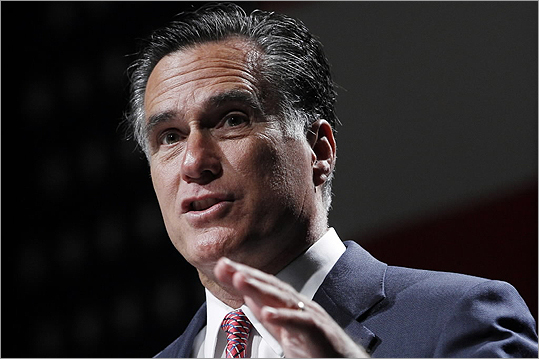Most Romney/Ryan supporters wouldn't understand the significance of this issue and it exceeds their attention span, but if you're above the rest, you might find it of value:
Mitt and the junk bond king
 Mitt Romney in Orlando, Fla. on June 21, 2012. The presidential hopeful teamed up with junk-bond king Michael Milken at the height of the 1980s buyout boom. (Charles Dharapak/AP Photo)
Mitt Romney in Orlando, Fla. on June 21, 2012. The presidential hopeful teamed up with junk-bond king Michael Milken at the height of the 1980s buyout boom. (Charles Dharapak/AP Photo)It was at the height of the 1980s buyout boom when Mitt Romney went in search of $300 million to finance one of the most lucrative deals he would ever manage. The man who would help provide the money was none other than the famed junk-bond king Michael Milken.
What transpired would become not just one of the most profitable leveraged buyouts of the era, but also one of the most revealing stories of Romney’s Bain Capital career. It showed how he pivoted from being a relatively cautious investor to risking his reputation for a big payoff. It is one that Romney has rarely, if ever, mentioned in his two bids for the presidency, perhaps because the Houston-based department store chain that Bain assembled later went into bankruptcy.
But what distinguishes this deal from the nearly 100 others that Romney did over a 15-year period was his close work with Milken’s firm, Drexel Burnham Lambert Inc. At the time of the deal, it was widely known that Milken and his company were under federal investigation, yet Romney decided to go ahead with the deal because Drexel had a unique ability to sell high-risk, high-yield debt instruments, known as “junk bonds.”
The Obama campaign has criticized the deal as showing Romney’s eagerness to make a “profit at any cost,” because workers lost jobs, and challenged Romney’s assertion that his business background best prepares him for the presidency. Romney, meanwhile, once referred to the deal as emanating from “the glorious days of Drexel Burnham,” saying, “it was fun while it lasted,” in a little-noticed interview with American Banker magazine.
The “glorious” part, for Romney at least, was that he used junk-bond financing to turn a $10 million investment into a $175 million profit for himself, his partners, and his investors. It marked a turning point for Romney, according to Marc Wolpow, a former Drexel employee who was involved in the deal and later was hired by Romney to work at Bain Capital.
“Mitt, I think, spent his life balanced between fear and greed,” Wolpow said. “He knew that he had to make a lot of money to launch his political career. It’s very hard to make a lot of money without taking some kind of reputational risk along the way. It’s just hard to do. It doesn’t mean you have to do anything illegal or immoral, but you often have to take reputational risk to make money.”
So it was that Romney decided to rely on a man and a company in the thick of one of the most intensive investigations ever undertaken by the Securities and Exchange Commission.
It happened in 1988, the fourth year of Bain Capital’s existence. Romney was shifting his focus from venture capital, funding younger companies, to buying larger, established businesses, which sometimes were troubled.Continued...
http://www.boston.com/business/articles/2012/06/24/the_story_behind_mitt_romneys_work_with_michael_milken_it_was_fun_while_it_lasted/
http://www.boston.com/business/articles/2012/06/24/the_story_behind_mitt_romneys_work_with_michael_milken_it_was_fun_while_it_lasted/
No comments:
Post a Comment